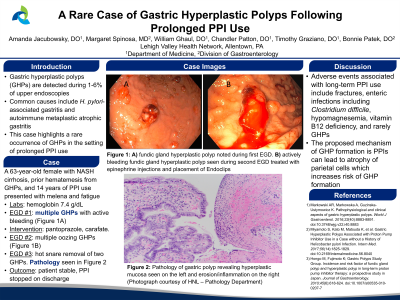Sunday Poster Session
Category: Stomach
P1393 - A Rare Case of Gastric Hyperplastic Polyps Following Prolonged PPI Use
Sunday, October 22, 2023
3:30 PM - 7:00 PM PT
Location: Exhibit Hall

Has Audio

Amanda Jacubowsky, DO, MSMEd
Lehigh Valley Health Network
Allentown, PA
Presenting Author(s)
Amanda Jacubowsky, DO, MSMEd1, Margaret Spinosa, MD1, William Ghaul, DO1, Chandler Patton, DO1, Timothy Graziano, DO1, Bonnie Patek, DO2
1Lehigh Valley Health Network, Allentown, PA; 2Eastern Pennsylvania Gastrointestinal and Liver Specialists, Allentown, PA
Introduction: Gastric hyperplastic polyps (GHPs) are detected during 1-6% of upper endoscopies. The most common causes for GHP development include H. pylori-associated gastritis and autoimmune metaplastic atrophic gastritis. Here, we discuss a rare case of multiple gastric polyps in a H. pylori-negative patient with a fourteen-year history of proton pump inhibitor therapy for gastroesophageal reflux disease.
Case Description/Methods: A 63-year-old female with a past medical history of NASH cirrhosis, gastric polyps complicated by prior hematemesis, and GERD on twice daily pantoprazole for fourteen years presented to the hospital for fatigue, abdominal pain, dizziness, and melena. On arrival, lab testing was notable for hemoglobin of 7.4 g/dL and the patient received 2 units of packed red blood cells with evidence of active melena. Gastroenterology was consulted and performed an upper endoscopy which showed multiple fundic gland polyps with active oozing. She was started on pantoprazole and carafate and transferred to a tertiary care center for advanced endoscopy evaluation. A repeat EGD redemonstrated multiple oozing inflammatory gastric polyps which were treated with epinephrine injections and placement of Endoclips. With a high risk of bleeding after upper endoscopy, the patient was left intubated and transferred to the intensive care unit for airway protection. A third EGD noted a pre-pyloric channel pedunculated polyp and two gastric polyps in the gastric antrum with active oozing. The two gastric polyps were removed with a hot snare and treated with clip placement. Pathology revealed inflamed, eroded, benign hyperplastic polyps. There were concerns that the patient had GHPs in the setting of prolonged PPI use and her pantoprazole was discontinued. She did not have further episodes of melena and was able to be extubated with eventual discharge home.
Discussion: Adverse events associated with long-term PPI use are based on poor quality data and include risk of fractures, enteric infections including Clostridium difficile, hypomagnesemia, vitamin B12 deficiency, and rarely GHPs. It is noted that PPIs lead to increased gastrin production and cause a trophic effect on parietal cells. This heightens the risk of fundic gland polyps as the cells are predisposed to hyperplasia. Discontinuation of PPI therapy can lead to a reduction in the amount of GHPs. This case highlights the importance of assessing medication lists to identify the appropriateness of PPI prescribing in order to prevent adverse events.
Disclosures:
Amanda Jacubowsky, DO, MSMEd1, Margaret Spinosa, MD1, William Ghaul, DO1, Chandler Patton, DO1, Timothy Graziano, DO1, Bonnie Patek, DO2. P1393 - A Rare Case of Gastric Hyperplastic Polyps Following Prolonged PPI Use, ACG 2023 Annual Scientific Meeting Abstracts. Vancouver, BC, Canada: American College of Gastroenterology.
1Lehigh Valley Health Network, Allentown, PA; 2Eastern Pennsylvania Gastrointestinal and Liver Specialists, Allentown, PA
Introduction: Gastric hyperplastic polyps (GHPs) are detected during 1-6% of upper endoscopies. The most common causes for GHP development include H. pylori-associated gastritis and autoimmune metaplastic atrophic gastritis. Here, we discuss a rare case of multiple gastric polyps in a H. pylori-negative patient with a fourteen-year history of proton pump inhibitor therapy for gastroesophageal reflux disease.
Case Description/Methods: A 63-year-old female with a past medical history of NASH cirrhosis, gastric polyps complicated by prior hematemesis, and GERD on twice daily pantoprazole for fourteen years presented to the hospital for fatigue, abdominal pain, dizziness, and melena. On arrival, lab testing was notable for hemoglobin of 7.4 g/dL and the patient received 2 units of packed red blood cells with evidence of active melena. Gastroenterology was consulted and performed an upper endoscopy which showed multiple fundic gland polyps with active oozing. She was started on pantoprazole and carafate and transferred to a tertiary care center for advanced endoscopy evaluation. A repeat EGD redemonstrated multiple oozing inflammatory gastric polyps which were treated with epinephrine injections and placement of Endoclips. With a high risk of bleeding after upper endoscopy, the patient was left intubated and transferred to the intensive care unit for airway protection. A third EGD noted a pre-pyloric channel pedunculated polyp and two gastric polyps in the gastric antrum with active oozing. The two gastric polyps were removed with a hot snare and treated with clip placement. Pathology revealed inflamed, eroded, benign hyperplastic polyps. There were concerns that the patient had GHPs in the setting of prolonged PPI use and her pantoprazole was discontinued. She did not have further episodes of melena and was able to be extubated with eventual discharge home.
Discussion: Adverse events associated with long-term PPI use are based on poor quality data and include risk of fractures, enteric infections including Clostridium difficile, hypomagnesemia, vitamin B12 deficiency, and rarely GHPs. It is noted that PPIs lead to increased gastrin production and cause a trophic effect on parietal cells. This heightens the risk of fundic gland polyps as the cells are predisposed to hyperplasia. Discontinuation of PPI therapy can lead to a reduction in the amount of GHPs. This case highlights the importance of assessing medication lists to identify the appropriateness of PPI prescribing in order to prevent adverse events.
Disclosures:
Amanda Jacubowsky indicated no relevant financial relationships.
Margaret Spinosa indicated no relevant financial relationships.
William Ghaul indicated no relevant financial relationships.
Chandler Patton indicated no relevant financial relationships.
Timothy Graziano indicated no relevant financial relationships.
Bonnie Patek indicated no relevant financial relationships.
Amanda Jacubowsky, DO, MSMEd1, Margaret Spinosa, MD1, William Ghaul, DO1, Chandler Patton, DO1, Timothy Graziano, DO1, Bonnie Patek, DO2. P1393 - A Rare Case of Gastric Hyperplastic Polyps Following Prolonged PPI Use, ACG 2023 Annual Scientific Meeting Abstracts. Vancouver, BC, Canada: American College of Gastroenterology.
